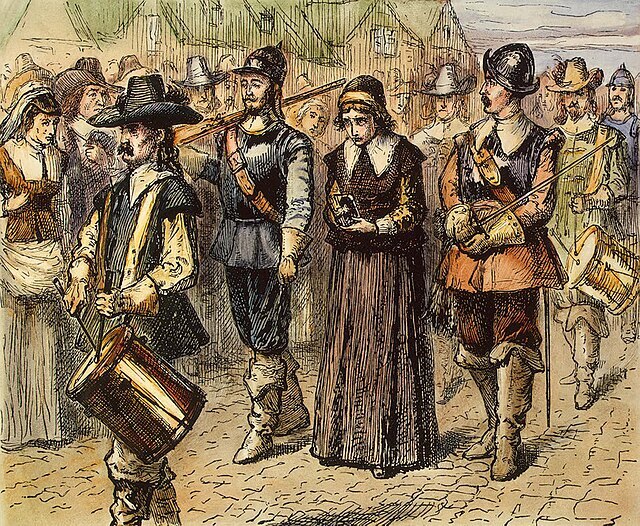Mary Dyer and the Quakers in New England
One of the most famous religious dissenters in seventeenth-century colonial North America (in the beginning of the British colonisation) was a woman called Mary Dyer, who had migrated to Boston, Massachusetts in the early 1630s. There she became a follower of Anne Hutchinson, who was condemned for heresy (see clipping on Anne Hutchinson). When Hutchinson fled to Rhode Island, Mary Dyer followed her. Dyer, however, later travelled back to England where she became a Quaker. Quakers, also known as the Society of Friends, are Protestants. But they do not hold to an elaborate and strict confession of faith; instead they stress the direct relation that a person may develop with God. They do not have clergy or rituals and their meetings for worship are often held in silence. Moral and inner beliefs are key guides in their faith. They believe that each person has an inner light (part of God's spirit) inside them. Today, they are renowned for their tranquillity of mind and their pacifism. In the seventeenth century, however, they were feared for their radicalism and perceived provocations. They deliberately disturbed order by crying out loud, even running around naked, and interrupting the religious services of other churches in order to provoke reactions as a means to attract attention to their ideas. Some actively sought to become martyrs for their cause, Mary Dyer being one such.
Dyer returned to Boston in 1657 where she promoted the teachings of Quakers. She was imprisoned and exiled with the threat of being executed if she returned. When she did, she finally was hanged.
In the 1620s a group of rigorous Protestants, called Puritans, settled in the region of Massachusetts (in North-east America). They intended to live according to their strict interpretation of Christianity and did not accept dissidence. Rhode Island in contrast was established by Roger Williams, also a devout Christian but one with some extraordinary radical ideas. Under his inspiration, Rhode Island granted freedom of religion to all (see all clippings on the Charter of Rhode Island and Roger Williams). While persecuted in Massachusetts, Quakers were allowed to live and practice freely in neighbouring Rhode Island. Although the founder of Rhode Island, Roger Williams, found them extremely irritating and even repugnant because of their behaviour and disrespect for others, he valued the freedom of religion and of expression more (to understand why, see the clippings on Roger Williams). Later, Quakers developed an open and tolerant attitude toward people of other faiths and denominations. Under the inspiration of the Quaker William Penn they established another open and tolerant colony in what is now the state of Pennsylvania.
If you were the leader of Rhode Island, would you have allowed Quakers? Why/why not? Why do you think Roger Williams allowed them? Do you agree with people who show disrespect for the beliefs of others to highlight their own beliefs? Are there limits to what one can tolerate?
For more information on this and other peace treaties, see

